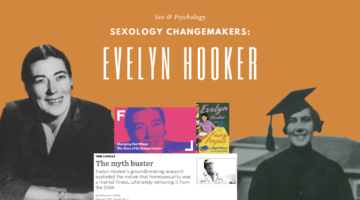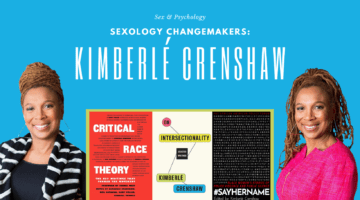The True Story of How I Became a Sex Educator and Researcher
March 10, 2021 by Justin Lehmiller
Our professional biographies tend to serve as a “highlight reel”—they only say the great things we’ve accomplished and don’t reveal the struggles, challenges, and uncertainties that went into building a career. To lift back the curtain on this, the Society for Personality and Social Psychology (SPSP) recently asked a number of scholars to submit their official bios along with their “unofficial bios” that reveal an extremely different version of the story with more twists and turns.
You can read some of the examples here. Although I didn’t participate in it, I thought it would be fun to do something similar on the blog. So here goes—I’ll start with my official bio, followed by the real, behind-the-scenes story.
Official Bio of Dr. Justin J. Lehmiller
Dr. Justin Lehmiller received his Ph.D. in Social Psychology from Purdue University. He is a Research Fellow at The Kinsey Institute and author of the book Tell Me What You Want: The Science of Sexual Desire and How It Can Help You Improve Your Sex Life. Dr. Lehmiller is an award-winning educator, having been honored three times with the Certificate of Teaching Excellence from Harvard University, where he taught for several years. He is also a prolific researcher and scholar who has published more than 50 academic works to date, including a textbook titled The Psychology of Human Sexuality (now in its second edition) that is used in college classrooms around the world. Dr. Lehmiller’s studies have appeared in all of the leading journals on human sexuality, including the Journal of Sex Research, Archives of Sexual Behavior, and The Journal of Sexual Medicine.
Dr. Lehmiller has run the popular blog Sex and Psychology since 2011. It receives millions of page views per year and is rated among the top sex blogs on the internet. In 2019, he launched the Sex and Psychology Podcast. It ranks among the top sexuality podcasts in several countries and has been named one of “11 sex podcasts that will help you get better in bed” by Men’s Health.
Dr. Lehmiller has been interviewed by numerous media outlets, including The Wall Street Journal, The New York Times, The Chicago Tribune, The Boston Globe, CNN, The Atlantic, The Globe and Mail, and The Sunday Times. He has been named one of 5 “Sexperts” You Need to Follow on Twitter by Men’s Health and one of the “modern-day masters of sex” by Nerve. Dr. Lehmiller has appeared on the Netflix series Sex, Explained, he has been on several episodes of the television program Taboo on the National Geographic Channel, and he has been a guest on Dr. Phil. Dr. Lehmiller has also appeared on numerous podcasts and radio shows, including the Savage Lovecast, the BBC’s Up All Night, and several NPR programs (1A, Radio Times, and Airtalk).
He is a popular freelance writer, penning columns and op-eds for major publications, including The Washington Post, Playboy, USA Today, VICE, Psychology Today, Men’s Health, Politico, and New York Magazine. He has also interviewed several prominent authors, journalists, and psychologists about their work for his blog and podcast, including Dr. Sanjay Gupta, Lisa Ling, Drs. John and Julie Gottman, and bestselling authors Christopher Ryan (Sex at Dawn) and Lisa Taddeo (Three Women).
Unofficial Bio of Dr. Justin J. Lehmiller
When Justin’s parents asked him what he wanted to study in college, he said “psychology.” He had taken a couple of psychology courses in high school that he found to be absolutely fascinating; however, his parents discouraged him from this because getting into a PhD program was tough and uncertain and, if that didn’t work out, they didn’t see much potential in a Bachelor’s degree in psychology. They encouraged him to pursue a career in occupational therapy (OT) instead because a family friend said “they needed more men in the field,” and also because his parents saw it as a path to job security with a pretty good paycheck.
He applied to a 5-year combined Bachelor’s/Master’s program in OT at Gannon University and was admitted. Incidentally, he was one of two men in the entire program. He spent a year and a half in it and made straight As in every course, including biochemistry and physics—but he wasn’t happy. He recognized the importance of OT to society, but it wasn’t his passion. After showing his parents that he was taking college seriously and earning good grades, they allowed him to switch his major to psychology.
Upon completing his Bachelor’s degree, he only applied to Master’s programs in psychology because he didn’t think he had the chops to get into a PhD program right away. The inferiority complex was strong in this one, so he didn’t even try. He applied and was accepted to Villanova University’s Master’s program in experimental psychology. He was not competitive enough of a candidate to receive an assistantship initially, although he eventually received one after another student dropped out.
He really wanted to study social psychology at Villanova, but there was only one social psychologist on staff at the time and several interested students. The only option for him was to beg one of the clinical psychologists to let him do a social psychology study for his Master’s thesis.
As he began looking for PhD programs to apply to, he met Dr. Chris Agnew at a meeting of the American Psychological Association. Chris was studying romantic relationships and Justin thought that sounded like a fun thing to spend his life doing. Plus, Chris was a super cool guy who seemed like a fantastic mentor. He applied and was admitted to Purdue’s social psychology program, although he was initially waitlisted (and rejected from all but one other program). Justin’s plan was to get his doctorate and become a college professor. Teaching and research sounded like things he could probably do.
Justin was assigned to teach a Health Psychology course at Purdue during his first year. He had never taught a class before and quickly realized that he was very uncomfortable with public speaking. The class was a disaster. Attendance dropped 60-70% within the first couple of weeks. He had no idea what he was doing and dreaded going to class each day—and he received poor evaluations in th
e end.
Around the same time, Justin submitted his first academic paper to a journal, it was promptly rejected and came with this review: “This manuscript is fatally flawed and of marginal utility, which is a shame because potentially interesting questions could have been asked given the topic and timing of the research. The tone of this manuscript represents the worst in scientific misconstrual, particularly because the claims are silly, wrong, or not warranted by the data.” Justin clearly sucked at both teaching and research—and if he couldn’t do those things well, how would he ever become a college professor?
He also started hearing horror stories from advanced students in his program who couldn’t find jobs and were sticking around for 6 or 7 years in the hope of eventually landing a job—any job. All of this led Justin to question what the hell he was doing with his life. Maybe he should have listened to his parents after all? Chris encouraged Justin to stick with it, though, as did his friends and mentors.
The next year, Justin got assigned to be a teaching assistant for a human sexuality course taught by Dr. Janice Kelly. It changed his life. He had to lead weekly discussion sections with students and answer their sex questions (a subject he knew next to nothing about, having attended Catholic schools most of his life). He read about sex extensively and instantly knew he had found what he really wanted to do with his career. He saw it as something fun and interesting—but also a way that he could make a real difference. He realized how little most people actually know about sex, and how education can correct so many harmful myths and misconceptions.
An opportunity to teach his own human sexuality class opened up the following year, and he took it. This time around, teaching was different—he was passionate about the subject and the students were, too. He had no problems with attendance. He ended up teaching this course six times before he graduated and eventually received a teaching award for it. He found that he loved being a sex educator.
He also found a solution to his public speaking anxiety: he started taking a beta-blocker (propranolol) on public speaking days, which removed physiological symptoms of anxiety. This allowed him to feel like himself in front of a crowd and, after just a few months, he no longer needed to take the medication—the anxiety had gone away completely.
He started conducting his own sex research, too, including a series of studies with Dr. Kelly on friends with benefits. His research skills improved and his studies started getting accepted instead of rejected.
He eventually landed a job at Colorado State University as an assistant professor, where he stayed for three years and continued his work as a sex educator and researcher. His partner couldn’t get a job in the area and had just taken a job in Boston, so Justin applied for every academic job within two hours of Boston. He was turned down for all of them. As a last-ditch effort, he applied for a teaching position at Harvard but had absolutely no confidence in it. He almost didn’t submit the application, but his partner encouraged him to do so. Justin had applied to Harvard’s PhD program previously and was rejected—if they didn’t want him as a student, why the heck would they want him as a teacher?
To his great surprise, he got the job at Harvard, where he stayed for three years. However, he had given up his tenure-track job in Colorado for a teaching position in Boston with no job security. So he decided to reinvent himself just in case things didn’t work out. In his spare time, he started a blog, wrote a human sexuality textbook, and became a freelance media writer. Communicating about sex science to the public became his hobby and was going to be his backup career in case the college professor thing didn’t work out.
Eventually, Justin’s partner wanted to move to Indianapolis for a job opportunity, so they left Boston. But Justin didn’t have a job at first and his backup plan wasn’t yet enough to be a full-time job. He knew the Kinsey Institute was nearby, so he drafted a letter to the director in the hope of establishing a connection, but he never sent it. He had a severe case of imposter syndrome and did not feel accomplished or experienced enough to have anything to do with what he saw as the premier hub for sex research in the world.
Much to his surprise, the associate director of the Institute reached out to him after he moved to Indiana to explore opportunities for working together. It was actually his hobby/backup plan that caught their eye—they were interested in working together to disseminate sex science to the public and were impressed with what he had done with his blog and social media.
Justin affiliated with Kinsey, but also jumped back on the tenure track with a job as the Director of the Social Psychology Program at Ball State University, which fortuitously opened up about 4 months after he moved to Indianapolis. After 3.5 years, he decided to leave full-time academics and do his own thing. His science communication hobby had managed to grow into a full-time job and it was no longer feasible to do that and academics. Plus, he found that the science communication work was really where his passion was. So, the backup plan officially became “the plan.”
Justin now spends every day finding new ways to help educate and inform the public about the science of sex. He’s still not sure how things ended up this way, but wouldn’t trade his current job for anything.
Want to learn more about Sex and Psychology? Click here for more from the blog or here to listen to the podcast. Follow Sex and Psychology on Facebook, Twitter (@JustinLehmiller), or Reddit to receive updates. You can also follow Dr. Lehmiller on YouTube and Instagram.
Image Source: 123RF

Dr. Justin Lehmiller
Founder & Owner of Sex and PsychologyDr. Justin Lehmiller is a social psychologist and Research Fellow at The Kinsey Institute. He runs the Sex and Psychology blog and podcast and is author of the popular book Tell Me What You Want. Dr. Lehmiller is an award-winning educator, and a prolific researcher who has published more than 50 academic works.
Read full bio >


